- Home
- Robert Ervin Howard
The Pool of the Black One (conan the barbarian)
The Pool of the Black One (conan the barbarian) Read online
The Pool of the Black One
( Conan the Barbarian )
Robert Ervin Howard
The Pool of the Black One
by Robert Ervin Howard
I
Into the west, unknown of man,
Ships have sailed since the world began.
Read, if you dare, what Skelos wrote,
With dead hands fumbling his silken coat;
And follow the ships through the wind-blown wrack
Follow the ships that come not back.
Sancha, once of Kordava, yawned daintily, stretched her supple limbs luxuriously, and composed herself more comfortably on the ermine-fringed silk spread on the carack's poop-deck. That the crew watched her with burning interest from waist and forecastle she was lazily aware, just as she was also aware that her short silk kirtle veiled little of her voluptuous contours from their eager eyes. Wherefore she smiled insolently and prepared to snatch a few more winks before the sun, which was just thrusting his golden disk above the ocean, should dazzle her eyes.
But at that instant a sound reached her ears unlike the creaking of timbers, thrum of cordage and lap of waves. She sat up, her gaze fixed on the rail, over which, to her amazement, a dripping figure clambered. Her dark eyes opened wide, her red lips parted in an O of surprize. The intruder was a stranger to her. Water ran in rivulets from his great shoulders and down his heavy arms. His single garment—a pair of bright crimson silk breeks—was soaking wet, as was his broad gold-buckled girdle and the sheathed sword it supported. As he stood at the rail, the rising sun etched him like a great bronze statue. He ran his fingers through his streaming black mane, and his blue eyes lit as they rested on the girl.
"Who are you?" she demanded. "Whence did you come?"
He made a gesture toward the sea that took in a whole quarter of the compass, while his eyes did not leave her supple figure.
"Are you a merman, that you rise up out of the sea?" she asked, confused by the candor of his gaze, though she was accustomed to admiration.
Before he could reply, a quick step sounded on the boards, and the master of the carack was glaring at the stranger, fingers twitching at sword-hilt.
"Who the devil are you, sirrah?" this one demanded in no friendly tone.
"I am Conan," the other answered imperturbably. Sancha pricked up her ears anew; she had never heard Zingaran spoken with such an accent as the stranger spoke it.
"And how did you get aboard my ship?" The voice grated with suspicion.
"I swam."
"Swam!" exclaimed the master angrily. "Dog, would you jest with me? We are far beyond sight of land. Whence do you come?"
Conan pointed with a muscular brown arm toward the east, banded in dazzling gold by the lifting sun.
"I came from the Islands ."
"Oh!" The other regarded him with increased interest. Black brows drew down over scowling eyes, and the thin lip lifted unpleasantly.
"So you are one of those dogs of the Barachans."
A faint smile touched Conan's lips.
"And do you know who I am?" his questioner demanded.
"This ship is the Wastrel; so you must be Zaporavo."
"Aye!" It touched the captain's grim vanity that the man should know him. He was a tall man, tall as Conan, though of leaner build. Framed in his steel morion his face was dark, saturnine and hawk-like, wherefore men called him the Hawk. His armor and garments were rich and ornate, after the fashion of a Zingaran grandee. His hand was never far from his sword-hilt.
There was little favor in the gaze he bent on Conan. Little love was lost between Zingaran renegades and the outlaws who infested the Baracha Islands off the southern coast of Zingara . These men were mostly sailors from Argos , with a sprinkling of other nationalities. They raided the shipping, and harried the Zingaran coast towns, just as the Zingaran buccaneers did, but these dignified their profession by calling themselves Freebooters, while they dubbed the Barachans pirates. They were neither the first nor the last to gild the name of thief.
Some of these thoughts passed through Zaporavo's mind as he toyed with his sword-hilt and scowled at his uninvited guest. Conan gave no hint of what his own thoughts might be. He stood with folded arms as placidly as if upon his own deck; his lips smiled and his eyes were untroubled.
"What are you doing here?" the Freebooter demanded abruptly.
"I found it necessary to leave the rendezvous at Tortage before moonrise last night," answered Conan. "I departed in a leaky boat, and rowed and bailed all night. Just at dawn I saw your topsails, and left the miserable tub to sink, while I made better speed in the water."
"There are sharks in these waters," growled Zaporavo, and was vaguely irritated by the answering shrug of the mighty shoulders. A glance toward the waist showed a screen of eager faces staring upward. A word would send them leaping up on the poop in a storm of swords that would overwhelm even such a fightingman as the stranger looked to be.
"Why should I burden myself with every nameless vagabond that the sea casts up?" snarled Zaporavo, his look and manner more insulting than his words.
"A ship can always use another good sailor," answered the other without resentment. Zaporavo scowled, knowing the truth of that assertion. He hesitated, and doing so, lost his ship, his command, his girl, and his life. But of course he could not see into the future, and to him Conan was only another wastrel, cast up, as he put it, by the sea. He did not like the man; yet the fellow had given him no provocation. His manner was not insolent, though rather more confident than Zaporavo liked to see.
"You'll work for your keep," snarled the Hawk. "Get off the poop. And remember, the only law here is my will."
The smile seemed to broaden on Conan's thin lips. Without hesitation but without haste he turned and descended into the waist. He did not look again at Sancha, who, during the brief conversation, had watched eagerly, all eyes and ears.
As he came into the waist the crew thronged about him Zingarans, all of them, half naked, their gaudy silk garments splashed with tar, jewels glinting in ear-rings and dagger-hilts. They were eager for the time-honored sport of baiting the stranger. Here he would be tested, and his future status in the crew decided. Up on the poop Zaporavo had apparently already forgotten the stranger's existence, but Sancha watched, tense with interest. She had become familiar with such scenes, and knew the baiting would be brutal and probably bloody.
But her familiarity with such matters was scanty compared to that of Conan. He smiled faintly as he came into the waist and saw the menacing figures pressing truculently about him. He paused and eyed the ring inscrutably, his composure unshaken. There was a certain code about these things. If he had attacked the captain, the whole crew would have been at his throat, but they would give him a fair chance against the one selected to push the brawl.
The man chosen for this duty thrust himself forward—a wiry brute, with a crimson sash knotted about his head like a turban. His lean chin jutted out, his scarred face was evil beyond belief. Every glance, each swaggering movement was an affront. His way of beginning the baiting was as primitive, raw and crude as himself.
"Baracha, eh?" he sneered. "That's where they raise dogs for men. We of the Fellowship spit on 'em—like this!"
He spat in Conan's face and snatched at his own sword.
The Barachan's movement was too quick for the eye to follow. His sledge-like fist crunched with a terrible impact against his tormentor's jaw, and the Zingaran catapulted through the air and fell in a crumpled heap by the rail.
Conan turned towards the others. But for a slumbering glitter in his eyes, his bearing was unchanged. Bu
t the baiting was over as suddenly as it had begun. The seamen lifted their companion; his broken jaw hung slack, his head lolled unnaturally.
"By Mitra, his neck's broken!" swore a black-bearded searogue.
"You Freebooters are a weak-boned race," laughed the pirate. "On the Barachas we take no account of such taps as that. Will you play at sword-strokes, now, any of you? No? Then all's well, and we're friends, eh?"
There were plenty of tongues to assure him that he spoke truth. Brawny arms swung the dead man over the rail, and a dozen fins cut the water as he sank. Conan laughed and spread his mighty arms as a great cat might stretch itself, and his gaze sought the deck above. Sancha leaned over the rail, red lips parted, dark eyes aglow with interest. The sun behind her outlined her lithe figure through the light kirtle which its glow made transparent. Then across her fell Zaporavo's scowling shadow and a heavy hand fell possessively on her slim shoulder. There were menace and meaning in the glare he bent on the man in the waist; Conan grinned back, as if at a jest none knew but himself.
Zaporavo made the mistake so many autocrats make; alone in somber grandeur on the poop, he underestimated the man below him. He had his opportunity to kill Conan, and he let it pass, engrossed in his own gloomy ruminations. He did not find it easy to think any of the dogs beneath his feet constituted a menace to him. He had stood in the high places so long, and had ground so many foes underfoot, that he unconsciously assumed himself to be above the machinations of inferior rivals.
Conan, indeed, gave him no provocation. He mixed with the crew, lived and made merry as they did. He proved himself a skilled sailor, and by far the strongest man any of them had seen. He did the work of three men, and was always first to spring to any heavy or dangerous task. His mates began to rely upon him. He did not quarrel with them, and they were careful not to quarrel with him. He gambled with them, putting up his girdle and sheath for a stake, won their money and weapons, and gave them back with a laugh. The crew instinctively looked toward him as the leader of the forecastle. He vouchsafed no information as to what had caused him to flee the Barachas, but the knowledge that he was capable of a deed bloody enough to have exiled him from that wild band increased the respect felt toward him by the fierce Freebooters. Toward Zaporavo and the mates he was imperturbably courteous, never insolent or servile.
The dullest was struck by the contrast between the harsh, taciturn, gloomy commander, and the pirate whose laugh was gusty and ready, who roared ribald songs in a dozen languages, guzzled ale like a toper, and—apparently—had no thought for the morrow.
Had Zaporavo known he was being compared, even though unconsciously, with a man before the mast, he would have been speechless with amazed anger. But he was engrossed with his broodings, which had become blacker and grimmer as the years crawled by, and with his vague grandiose dreams; and with the girl whose possession was a bitter pleasure, just as all his pleasures were.
And she looked more and more at the black-maned giant who towered among his mates at work or play. He never spoke to her, but there was no mistaking the candor of his gaze. She did not mistake it, and she wondered if she dared the perilous game of leading him on.
No great length of time lay between her and the palaces of Kordava, but it was as if a world of change separated her from the life she had lived before Zaporavo tore her screaming from the flaming caravel his wolves had plundered. She, who had been the spoiled and petted daughter of the Duke of Kordava, learned what it was to be a buccaneer's plaything, and because she was supple enough to bend without breaking, she lived where other women had died, and because she was young and vibrant with life, she came to find pleasure in the existence.
The life was uncertain, dream-like, with sharp contrasts of battle, pillage, murder, and flight. Zaporavo's red visions made it even more uncertain than that of the average Freebooter. No one knew what he planned next. Now they had left all charted coasts behind and were plunging further and further into that unknown billowy waste ordinarily shunned by seafarers, and into which, since the beginnings of Time, ships had ventured, only to vanish from the sight of man for ever. All known lands lay behind them, and day upon day the blue surging immensity lay empty to their sight. Here there was no loot—no towns to sack nor ships to burn. The men murmured, though they did not let their murmurings reach the ears of their implacable master, who tramped the poop day and night in gloomy majesty, or pored over ancient charts and time-yellowed maps, reading in tomes that were crumbling masses of worm-eaten parchment. At times he talked to Sancha, wildly it seemed to her, of lost continents, and fabulous isles dreaming unguessed amidst the blue foam of nameless gulfs, where horned dragons guarded treasures gathered by pre-human kings, long, long ago.
Sancha listened, uncomprehending, hugging her slim knees, her thoughts constantly roving away from the words of her grim companion back to a clean-limbed bronze giant whose laughter was gusty and elemental as the sea wind.
So, after many weary weeks, they raised land to westward, and at dawn dropped anchor in a shallow bay, and saw a beach which was like a white band bordering an expanse of gently grassy slopes, masked by green trees. The wind brought scents of fresh vegetation and spices, and Sancha clapped her hands with glee at the prospect of adventuring ashore. But her eagerness turned to sulkiness when Zaporavo ordered her to remain aboard until he sent for her. He never gave any explanation for his commands; so she never knew his reason, unless it was the lurking devil in him that frequently made him hurt her without cause.
So she lounged sulkily on the poop and watched the men row ashore through the calm water that sparkled like liquid jade in the morning sunlight. She saw them bunch together on the sands, suspicious, weapons ready, while several scattered out through the trees that fringed the beach. Among these, she noted, was Conan. There was no mistaking that tall brown figure with its springy step. Men said he was no civilized man at all, but a Cimmerian, one of those barbaric tribesmen who dwelt in the gray hills of the far North, and whose raids struck terror in their southern neighbors. At least, she knew that there was something about him, some super-vitality or barbarism that set him apart from his wild mates.
Voices echoed along the shore, as the silence reassured the buccaneers. The clusters broke up, as men scattered along the beach in search of fruit. She saw them climbing and plucking among the trees, and her pretty mouth watered. She stamped a little foot and swore with a proficiency acquired by association with her blasphemous companions.
The men on shore had indeed found fruit, and were gorging on it, finding one unknown golden-skinned variety especially luscious. But Zaporavo did not seek or eat fruit. His scouts having found nothing indicating men or beasts in the neighborhood, he stood staring inland, at the long reaches of grassy slopes melting into one another. Then, with a brief word, he shifted his sword-belt and strode in under the trees. His mate expostulated with him against going alone, and was rewarded by a savage blow in the mouth. Zaporavo had his reasons for wishing to go alone. He desired to learn if this island were indeed that mentioned in the mysterious Book of Skelos, whereon, nameless sages aver, strange monsters guard crypts filled with hieroglyph-careen gold. Nor, for murky reasons of his own, did he wish to share his knowledge, if it were true, with any one, much less his own crew.
Sancha, watching eagerly from the poop, saw him vanish into the leafy fastness. Presently she saw Conan, the Barachan, turn, glance briefly at the men scattered up and down the beach; then the pirate went quickly in the direction taken by Zaporavo, and likewise vanished among the trees.
Sancha's curiosity was piqued. She waited for them to reappear, but they did not. The seamen still moved aimlessly up and down the beach, and some had wandered inland. Many had lain down in the shade to sleep. Time passed and she fidgeted about restlessly. The sun began to beat down hotly, in spite of the canopy above the poop-deck. Here it was warm, silent, draggingly monotonous; a few yards away across a band of blue shallow water, the cool shady mystery of tree-fringed beach and woo
dland-dotted meadow beckoned her. Moreover, the mystery concerning Zaporavo and Conan tempted her.
She well knew the penalty for disobeying her merciless master, and she sat for some time, squirming with indecision. At last she decided that it was worth even one of Zaporavo's whippings to play truant, and with no more ado she kicked off her soft leather sandals, slipped out of her kirtle and stood up on the deck naked as Eve. Clambering over the rail and down the chains, she slid into the water and swam ashore. She stood on the beach a few moments, squirming as the sands tickled her small toes, while she looked for the crew. She saw only a few, at some distance up or down the beach. Many were fast asleep under the trees, bits of golden fruit still clutched in their fingers. She wondered why they should sleep so soundly, so early in the day.
None hailed her as she crossed the white girdle of sand and entered the shade of the woodland. The trees, she found, grew in irregular clusters, and between these groves stretched rolling expanses of meadow-like slopes. As she progressed inland, in the direction taken by Zaporavo, she was entranced by the green vistas that unfolded gently before her, soft slope beyond slope, carpeted with green sward and dotted with groves. Between the slopes lay gentle declivities, likewise swarded. The scenery seemed to melt into itself, or each scene into the other; the view was singular, at once broad and restricted. Over all a dreamy silence lay like an enchantment.
Then she came suddenly onto the level summit of a slope, circled with tall trees, and the dreamily faery-like sensation vanished abruptly at the sight of what lay on the reddened and trampled grass. Sancha involuntarily cried out and recoiled, then stole forward, wide-eyed, trembling in every limb.
It was Zaporavo who lay there on the sward, staring sightlessly upward, a gaping wound in his breast. His sword lay near his nerveless hand. The Hawk had made his last swoop.
It is not to be said that Sancha gazed on the corpse of her lord without emotion. She had no cause to love him, yet she felt at least the sensation any girl might feel when looking on the body of the man who was first to possess her. She did not weep or feel any need of weeping, but she was seized by a strong trembling, her blood seemed to congeal briefly, and she resisted a wave of hysteria.

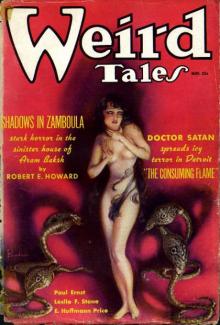 Shadows in Zamboula (conan the barbarian)
Shadows in Zamboula (conan the barbarian) Shadows in the Moonlight (conan the barbarian)
Shadows in the Moonlight (conan the barbarian)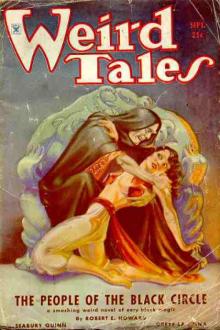 The People of the Black Circle (conan the barbarian)
The People of the Black Circle (conan the barbarian) Almuric
Almuric Xuthal of the Dusk (conan the barbarian)
Xuthal of the Dusk (conan the barbarian)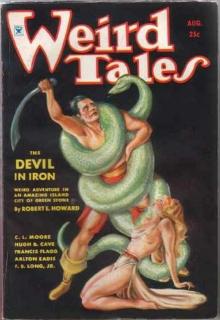 The Devil in Iron (conan the barbarian)
The Devil in Iron (conan the barbarian)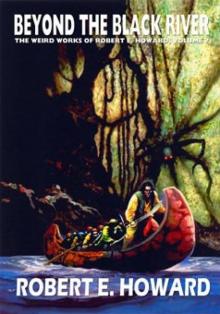 Beyond the Black River (conan the warrior)
Beyond the Black River (conan the warrior) The Phoenix on the Sword (conan the barbarian)
The Phoenix on the Sword (conan the barbarian)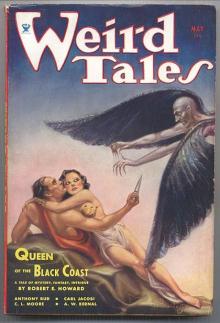 Queen of the Black Coast
Queen of the Black Coast The Tower of the Elephant (conan the barbarian)
The Tower of the Elephant (conan the barbarian) Black Colossus
Black Colossus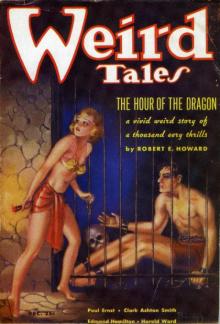 The Hour of the Dragon (conan the barbarian)
The Hour of the Dragon (conan the barbarian)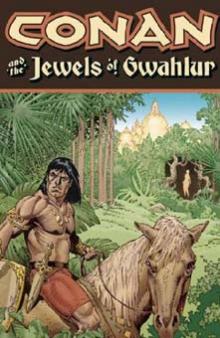 Jewels of Gwahlur (conan the warrior)
Jewels of Gwahlur (conan the warrior) Gods of the North (conan the barbarian)
Gods of the North (conan the barbarian) The Pool of the Black One (conan the barbarian)
The Pool of the Black One (conan the barbarian) A Witch Shall Be Born
A Witch Shall Be Born Red Nails (conan the warrior)
Red Nails (conan the warrior)